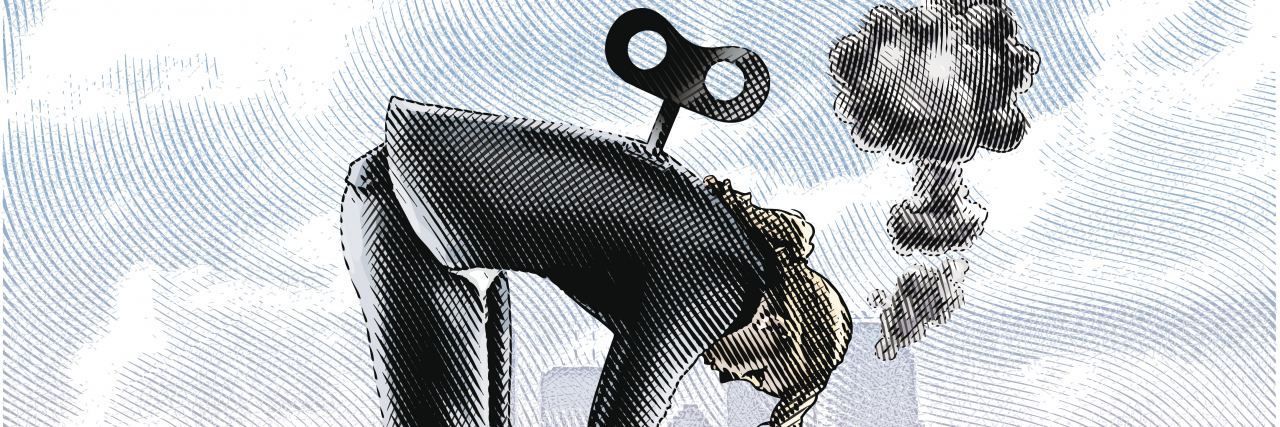When I was a kid, I developed my own ways to cope with the health difficulties I was facing without knowing that’s what I was doing. These coping mechanisms were often seen by adults as funny quirks and silliness, but they were never really challenged or discouraged until I got older. For example, to cope with physical symptoms, I’d hang upside down, sit and lay down in strange positions, and insist on sitting when expected to stand for too long. And to cope with mental/emotional symptoms, I’d find isolated places to hide both indoors and outdoors, go for long walks, and always kept a notebook on me for doodling and writing. If I was unable to practice my coping mechanisms when I needed them, it would cause me a lot of distress and sometimes cause me to be noticeably ill.
But a lot of the ways I managed my undiagnosed health issues changed when I was expected to act like an adult. I was expected to stop doing things that felt natural and right because I was supposed to be more responsible, more capable, and more mature. This began in junior high and high school, with the expectations to attend class unless gravely ill, participate in multiple extracurricular activities, and socialize properly rather than running off to be alone. Of course, I found new coping mechanisms, altered old ones, and found as many loopholes as I could, but my mental health took a sharp downturn and spiraled all throughout high school. And every few years we would be in the doctor’s office wondering why I was inexplicably weak, lightheaded, and/or nauseous.
After graduation and getting my first “real job,” the expectations of adulthood continued to escalate. Now I was ignoring my body’s signals to rest and take it easy, the danger signals that asked me to seek solitude, and even the physiological signals which told me I was hungry, thirsty, cold, or hot. These signals and the needs they indicated were not practical as an adult. I had to get up in the morning and go to work, regardless of how I felt. I had to eat before or after work and not during work, regardless of how I felt. I had to spend scheduled hours around people, and other hours by myself, regardless of how I felt. These were the requirements of an adult life, in order to access employment, pay the bills, and basically exist in the modern world.
At my first job, I was always on time, did quality work, was well-liked by both staff and customers, and it was killing me. I broke down at work multiple times a week, finding those secluded areas to collect myself and get on with the day. I’d go to the bathroom just to sit down and rest without getting caught. There were some tasks I had to do while on the floor because I couldn’t stand long enough to complete them.
A few years and several jobs later, I reached my limit for “pushing through it” and ended up unable to get out of bed for months, and permanently disabled at 25 years old.
As I’ve learned to manage my chronic conditions and begun work on my recovery from childhood trauma, a major theme has been relearning how to feel, identify, and respond to the signals I’ve been ignoring for years. Much of managing my physical symptoms has involved learning to detect early signals that point towards incoming symptoms. And learning to identify and care for my physical sensations has come hand in hand with learning to identify and care for my emotions.
Through my experiences, I’ve come to understand that the expectations of an “adult” are really the expectations of capitalism. As a disabled adult, I’ve had to come to terms with needing accommodations and asking for help every day. For instance, I need financial assistance, support accessing transportation, daily personal care, and more. This doesn’t make me any less of an adult, nor does it take away from my value as a member of society.
Embracing a life with disability has shown me there are more important things than the standards of society or the expectations of our community. The way that I feel matters, and the quality of my life matters.
It is my hope that my story will encourage others to prioritize their own well-being in any ways they can.
Getty image by George Peters.

